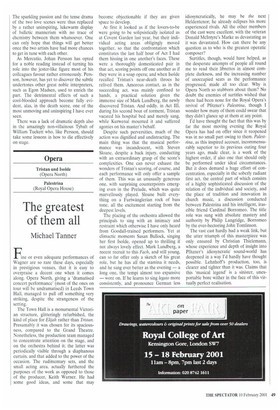Opera
Tristan und Isolde (Opera North) Palestrina (Royal Opera House)
The greatest of them all
Michael Tanner
inci or even adequate performances of Wagner are so rare these days, especially in prestigious venues, that it is easy to overpraise a decent one when it comes along. Opera North, giving a 'dramatised concert performance' (most of the ones on tour will be undramatised) in Leeds Town Hall, managed to pull off something very striking, despite the strangeness of the setting.
The Town Hall is a monumental Victorian structure, glitteringly refurbished, the kind of place for Elijah rather than Tristan. Presumably it was chosen for its spaciousness, compared to the Grand Theatre. Nonetheless, the production team managed to concentrate attention on the stage, and on the orchestra behind it; the latter was periodically visible through a diaphanous curtain, and that added to the power of the occasion. The rudimentary sets, and the small acting area, actually furthered the purposes of the work as opposed to those of the producer, Keith Warner. He had some good ideas, and some that may
become objectionable if they are given space to develop.
At first it looked as if the lovers-to-be were going to be solipsistically isolated as at Covent Garden last year, but their individual acting areas obligingly moved together, so that the confrontation which constitutes the last half hour of Act I had them hissing in one another's faces. These were a thoroughly domesticated pair in that act, scoring points off one another as if they were in a soap opera; and when Isolde recalled Tristan's near-death throes he relived them. Amorous contact, as in the succeeding act, was mainly confined to hands, a practical solution given the immense size of Mark Lundberg, the newly discovered Tristan. And oddly, in Act III, during his second bout of torment, Tristan vacated his hospital bed and merely sang, while Kurwenal mounted it and suffered agonies on his master's behalf.
Despite such perversities, much of the action was dignified and undistracting. The main thing was that the musical performance was incandescent, with Steven Sloane, despite a back injury, conducting with an extraordinary grasp of the score's complexities. One can never exhaust the wonders of Tristan's scoring, of course, and each performance will only offer a sample of them. This was an unusually generous one, with surprising counterpoints emerging even in the Prelude, which was quite marvellously played. Sloane built everything on a Furtwanglerian rock of bass tone, all the excitement starting from the deepest levels.
The placing of the orchestra allowed the principals to sing with an intimacy and restraint which otherwise I have only heard from Goodall-trained performers. Yet at climactic moments Susan Bullock, singing her first Isolde, opened up to thrilling if not always lovely effect. Mark Lundberg, a recent recruit to this Fach, and still young, can so far offer only a sketch of his great role, but he has all the stamina it needs, and he sang ever better as the evening — a long one, the tempi almost too expansive — wore on. If he learns to sing legato more consistently, and pronounce German less idiosyncratically, he may be the next Heldentenor; he already eclipses his more experienced rivals. All the other members of the cast were excellent, with the veteran Donald McIntyre's Marke as devastating as it was devastated. How can there be any question as to who is the greatest operatic composer?
Surtitles. though, would have helped, as the desperate attempts of people all round me to read their librettos in almost complete darkness, and the increasing number of unoccupied seats as the performance progressed, made all too clear. Why is Opera North so stubborn about them? No doubt the enemies of surtitles wished that there had been none for the Royal Opera's revival of Pfitzner's Palestrina. though I wonder how many of them could swear that they didn't glance up at them at any point.
I'd have thought the fact that this was by far the most moving evening the Royal Opera has had on offer since it reopened was in no small part owing to them. Palestrina, as this inspired account, incommensurably superior to its previous outing four years ago, made clear, is a work of the highest order, if also one that should only be performed under ideal circumstances. But it does demand a huge effort of concentration, especially in the soberly radiant first act, the central part of which consists of a highly sophisticated discussion of the relation of the individual and society, and the place of tradition and innovation in church music, a discussion conducted between Palestrina and his intelligent, irascible friend Cardinal Borromeo. The title role was sung with absolute mastery and authority by Philip Langridge, Borromeo by the ever-hectoring John Tomlinson.
• The vast cast hardly had a weak link, but the utter triumph of this masterpiece was only ensured by Christian Thielemann, whose experience and depth of insight into Pfitzner's idiosyncraticsound-world has deepened in a way I'd hardly have thought possible. Lehnhoff's production, too, is clearer and tighter than it was. Claims that this 'musical legend' is a sinister, unexportable bore wither in the face of this virtually perfect realisation.


































































 Previous page
Previous page